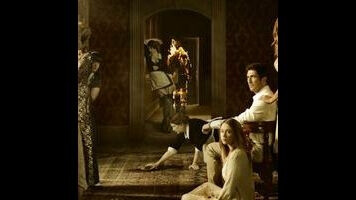American Horror Story: Freak Show: “Curtain Call”

Dandy Mott, not Jimmy Darling, has been American Horror Story: Freak Show’s secondary protagonist all along. Dandy and AHS have a lot in common. Dandy has an eye for spectacle, a deluded sense of panache, and an unhesitating enthusiasm for the kill. But he also has… let’s call it “poor impulse control.”
Dandy wants results, and he wants them now. He expects ticket sales to spike the minute he announces his new act. He wants the stage lighting—highly specific and tailored to his personal color theory (“Blue symbolizes night. For ‘Anything Goes,’ I need the magenta light to accentuate my spirited rendition!”)—perfected immediately. He kills his mother to escape her controlling scrutiny, he uses her money to buy the freak show he’s obsessed with, he slaughters the remaining performers so he can… wait, do what, exactly?
Dandy’s fun to watch, but his unreflective, pettish haste makes even his most entertaining scenes ultimately unsatisfying. They’re a trifle, not a crowning achievement. Dandy’s stories are never about the slow build, the long arc, the carefully constructed narrative. Dandy doesn’t think his way around obstacles. He mows down obstacles without even breaking stride.
That’s the first act of “Curtain Call” in a nutshell. It continues the efficient stage-setting of “Show Stoppers,” dispatching supporting characters with brutal expediency, clearing the way to return to the tale of Elsa Mars, the true heart of American Horror Story: Freak Show.
“Curtain Call” wisely elides much of the intervening eight years, giving the audience just a taste of Elsa’s road to success: long, fruitless days waiting in the network lobby, a fortuitous meeting with the sympathetic junior VP of casting (David Burtka!), glimpses into a combative professional marriage, all bringing Elsa—and us—to that fateful Halloween of 1960.
Here’s where our patience over this meandering, messy season pays off. The show often feels like a game of Exquisite Corpse, each episode building character arcs and themes with only the most tangential connection to what preceded it. But the finale manages to join together a season’s worth of fragments, giving the whole a belated sense of coherence, even of resonance, that was too often missing from individual episodes.
Seeing the fame she sweated and sacrificed (and murdered) for slipping from her grasp, Elsa ruefully laughs, “Might as well go out with a bang!” And AHS: Freak Show does go out with a bang. Performing on Halloween, Elsa knows she’s inviting Edward Mordrake to revisit her and conscript her soul to his spectral troupe. She expects doom and damnation, and instead is rewarded with her heart’s desire. “I just wanted to be loved,” she confides in the dying Massimo, and loved she will be for eternity.
Elsa’s rendition of “Heroes” is absurd, incongruous, ludicrous. It’s perfect. Bookending the season with David Bowie covers was inevitable, and it’s fitting that her swan song is both elegiac and triumphant. It’s also narratively nonsensical: Anachronisms aside, “Heroes” simply makes no sense as the opening number for a Halloween special. It’s preposterous, a fitting final number for a preposterous season.
Reunited with the makeshift family she cosseted and afflicted in equal measure in life, all her faults seen plainly and accepted (“You’re a terrible friend, you’re a pain in the ass boss, you can’t cook for shit!”), Elsa Mars will stand in an everlasting spotlight before a full house, basking in the adoration that eluded her in life. The handful of survivors—of her circus, of her life, of her vicious affections—get the ordinary happy ending they once dreamed of. It’s sappy, it’s sentimental, it’s predictable—and it’s satisfying in a way I couldn’t have predicted.
Clicking off the TV in the home she shares with Dot and Jimmy, Bette says “I feel like I’ve seen this act before.” Whatever you think of American Horror Story, there’s one reason we keep watching, season after season: We’ve never seen anything quite like this before.
Stray observations:
- This week in American Horror Poetry: Paul, hoping to squeeze as much livelihood as possible out of the foundering circus: “I say we let him keep feeding us until that lemon runs out of juice.”
- Putting Dandy in the water tank is a nice callback to the display tanks of the American Morbidity Museum, but the grace of that image is trampled a bit by Desiree’s long aside. “A man came through here, started putting our kind in glass jars,” she says, just in case we didn’t pick up on the imagery.
- Another handsome, haunting image: Penny, doing laundry when Dandy’s shooting spree begins, cowers behind a hanging sheet, and its sprays of red roses mimic blood spatters even before she takes a bullet.
- This week in “Maybe society is the real freak show”: Elsa, once the sadistic mistress of ceremonies for a sex cabaret, is now the sweetheart of Friday night, the toast of Hollywood… and her reputation is about to be destroyed not by the depravities she once embraced, but by long-lost footage of someone mutilating her against her will.
- That wraps up this season of American Horror Story. Thanks to Erik Adams for letting me step in as reviewer partway through season four, and thank you for reading along!